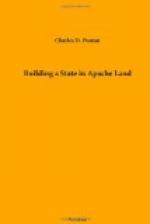I anticipated the fourteenth amendment, and distributed the Indian goods without regard to race, color or former condition of servitude. Anybody that came along in need of blankets or tobacco was freely supplied. I wound up the Indian service with loss of about $5,000 out of my own pocket.
At camp on the Hassayamp, Henry Wickenburg came in with some specimens of gold quartz he had found out to the west, at a place subsequently called Vulture, and wanted me to buy the find. I said, “Henry, I don’t want to buy your mine, but I will give you twenty-five dollars’ worth of grub and a meerschaum pipe if you will go away and leave me alone.”
I was also importuned to purchase Miguel Peralta’s title from the King of Spain for the Salt River Valley; but my experience with Spanish grants in Texas, California and Arizona, did not incline me to invest, even if the grant had been made by the Pope of Rome, and guaranteed by the Continental Congress.
The only members of the Woolsey Expedition remaining in Arizona that I know of are Peeples of Phoenix, Chase of Antelope, and Blair at Florence.
The government of the United States can never recompense the people of Arizona for the atrocities committed by the Apaches. It will never do to make the plea that a government so vain-glorious and boastful could not have conquered this tribe of savages, if the will to do so had existed. Now, after forty years of devastation, the government pays the Apaches one hundred and fifty thousand dollars a year in goods to maintain a quasi peace. The settlers are not at any time secure against an Apache outbreak, and there are at the present time some Apaches on the war-path, which the government acknowledges its impotency to capture. “A Century of Dishonor” was a well written book, and contains many unpleasant truths.
In the meantime, while I was delivering the Indian goods, my colleagues in the territorial government had crossed the plains, and established the capital at a remote place in the northern mountains, which they called “Prescott,” in honor of the Mexican historian. Just as was supposed, they quarreled all the way across the plains about who should be the first delegate to Congress from a Territory they had never seen.
Upon my arrival at Prescott they were perfectly disgusted to learn that I had already been declared a candidate, and was likely to get the votes of the people. The political machine had not then been organized, and the people had some say in the elections.
The election was held in due time, and I was elected the first delegate to Congress from Arizona.
The “carpet baggers” worked the Territory for all it was worth, as is evidenced by the public debt, which is three times as great as any State or Territory in the Union, per capita. The Capital was moved from town to town, as a political factor in the election of delegates, but now rests at Phoenix, in the Salt River Valley, where it will permanently remain, as no other place in the Territory can ever rival Phoenix in the abundance of all that contributes to the comfort and happiness of life. The soil is fertile, the climate healthful, and with water storage in reservoirs a city will grow equal to any on the Nile.




